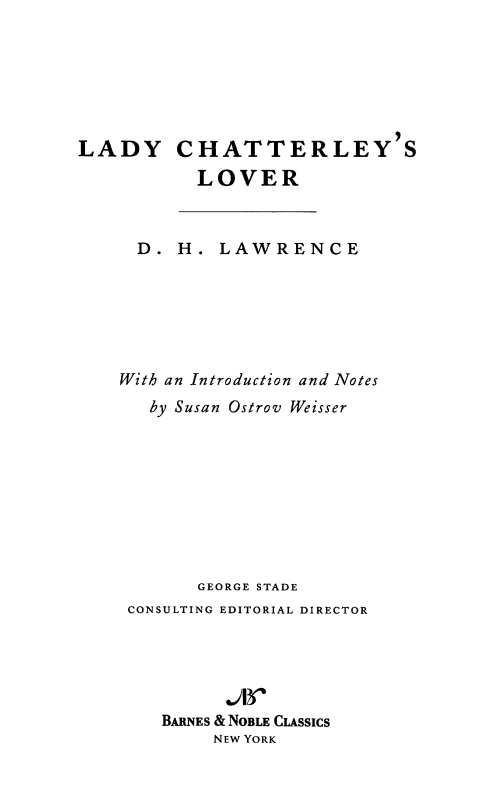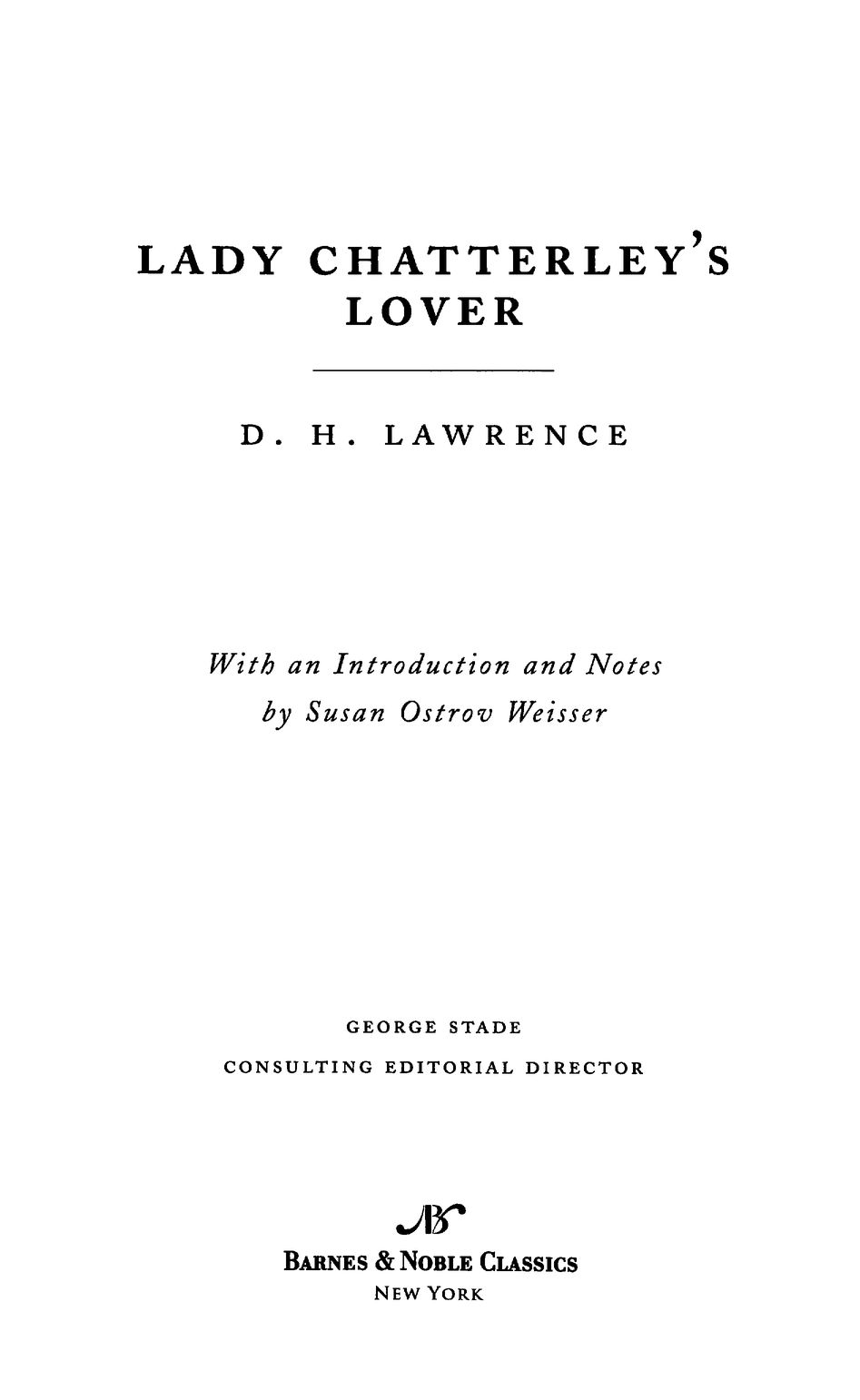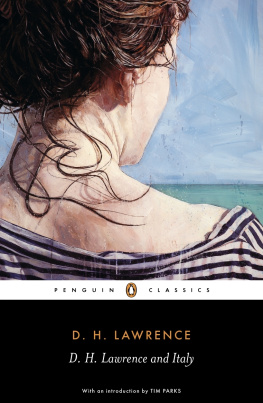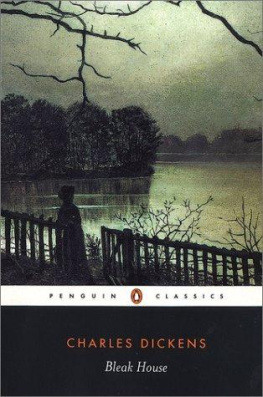
Table of Contents
FROM THE PAGES OF
LADY CHATTERLEYS LOVER
Ours is essentially a tragic age, so we refuse to take it tragically. (page 3)
Why couldnt a girl be queenly, and give the gift of herself? (page 5)
The beautiful pure freedom of a woman was infinitely more wonderful than any sexual love. The only unfortunate thing was that men lagged so far behind women in the matter. They insisted on the sex thing like dogs. (page 6)
Tevershall pit-bank was burning, had been burning for years, and it would cost thousands to put it out. So it had to burn. And when the wind was that way, which was often, the house was full of the stench of this sulphurous combustion of the earths excrement. But even on windless days the air always smelt of something under-earth: sulphur, iron, coal, or acid. And even on the Christmas roses the smuts settled persistently, incredible, like black manna from skies of doom. (pages 13-14)
Poor Connie! As the years drew on it was the fear of nothingness in her life that affected her. Cliffords mental life and hers gradually began to feel like nothingness. Their marriage, their integrated life based on a habit of intimacy, that he talked about: there were days when it all became utterly blank and nothing. It was words, just so many words. The only reality was nothingness, and over it a hypocrisy of words. (page 54)
She was stunned by this unexpected piece of brutality, at the moment when she was glowing with a sort of pleasure beyond words, and a sort of love for him. Because after all, like so many modern men, he was finished almost before he had begun. And that forced the woman to be active. (page 58)
Why dont men and women really like one another nowadays? (page 60)
She thought, as she had thought so often,... what a frail, easily hurt, rather pathetic thing a human body is, naked; somehow a little unfinished, incomplete! (page 75)
He was kind to the female in her, which no man had ever been. Men were very kind to the person she was, but rather cruel to the female, despising her or ignoring her altogether. Men were awfully kind to Constance Reid or to Lady Chatterley; but not to her womb they werent kind. And he took no notice of Constance or of Lady Chatterley; he just softly stroked her loins or her breasts. (page 130)
This was the divine love! After all, the moderns were right when they felt contempt for the performance; for it was a performance. It was quite true, as some poets said, that the God who created man must have had a sinister sense of humor, creating him a reasonable being, yet forcing him to take this ridiculous posture, and driving him with blind craving for this ridiculous performance. (page 184)
A mans a poor bit of a wastrel, blown about. (page 215)
She felt, now, she had come to the real bedrock of her nature, and was essentially shameless. She was her sensual self, naked and unashamed. She felt a triumph, almost a vainglory. So! That was how it was! That was life! That was how oneself really was! There was nothing left to disguise or be ashamed of. She shared her ultimate nakedness with a man, another being. (page 266)
I shall never divorce you. (page 321)

D. H. LAWRENCE
David Herbert Lawrence was born on September 11, 1885, in Eastwood, a coal-mining town in Nottinghamshire, England, the fourth child of a couple whose marriage Lawrence later described as one carnal, bloody fight. Lawrences psychologically intimate relationship with his mother would serve as the grounds for many of his novels. Lawrence studied to be a teacher but became interested in the arts. Jessie Chambers, a school love interest, submitted a number of Lawrences early poems to Ford Hermann Heuffer [Ford Madox Ford], editor of the English Review, and he published them. This first exposure would prove to be fruitful, and Lawrence soon published several novels, including The White Peacock (1911) and The Trespasser (1912), as well as Love Poems and Others (1913).
Lawrence gained fame and notoriety in 1913 with the publication of Sons and Lovers, a novel that was criticized by some as being too overtly sexual. Sons and Lovers was followed by The Rainbow (1915), a story of two sisters growing up in northern England that was banned upon its publication for its alleged obscenity. Women in Love, the sequel to The Rainbow, was published in 1920. His novel Lady Chatterleys Lover (1928) was pronounced obscene and banned in the United Kingdom and America. Despite the censorship, Lawrence remained unapologetic for creating art for my sake. His personal life, including his elopement with Frieda von Richthofen Weekley, wife of one of his professors and the mother of three children, fueled the aura of scandal that followed him throughout his career.
Despite censorship and other setbacks, in his exceptionally prolific literary career Lawrence authored more than a dozen novels, three volumes of stories and three volumes of novellas, an immense collection of poetry, and numerous works of nonfiction. He also wrote eight plays, most of which have been forgotten. The Lawrences traveled widely, but as Lawrences health worsened they settled in the south of France, where the author died on March 2, 1930. His ashes lie in a memorial chapel at his ranch in New Mexico.
THE WORLD OF D. H. LAWRENCE
ANDLADY CHATTERLEYS LOVER
| 1885 | David Herbert Lawrence is born on September 11 in Eastwood, Nottinghamshire, a working-class mining town in central England. The sickly Lawrence is confined to bed for much of his early childhood and grows close to his mother, who tends to him. |
| 1898- 1901 | Lawrence attends Nottingham High School on a scholarship, then takes a job as a clerk in a surgical appliance factory, but he leaves after suffering an attack of pneumonia. His brother, William Ernest, dies in October 1901. |
| 1902- 1906 | Lawrence takes a part-time teaching job at the British Schools in Eastwood and attends a teacher-training center in Ilkeston. |
| 1906 | Lawrence enrolls at University College, Nottingham, to get his teachers certificate; he leaves after two years. |
| 1909- 1910 | The English Review publishes several of Lawrences poems. His mother, Lydia, dies in December 1910; Lawrence assists her by administering an overdose of morphine. |
| 1911 | Lawrences first novel, The White Peacock, is published. |
| 1912 | Lawrence and Frieda von Richthofen, the wife of Lawrences former Nottingham professor Ernest Weekley and cousin of famous aviator Manfred von Richthofen (also known as the Red Baron), run away to Germany and Italy. |
| 1913 | Rejected at first by Heinemann Publishers, the autobiographical Sons and Lovers is published. Criticized for his graphic depiction of sexual relations, Lawrence defends himself by stating that whatever the blood feels, and believes, and says, is always true. |
| 1914 | World War I breaks out. Lawrence and Frieda marry on July 13. Unable to obtain passports, for the duration of the war they are forced to live in various places in England, including Cornwall and Derbyshire, where they share a house with John Middleton Murry and the writer Katherine Mansfield. |








